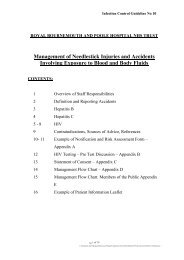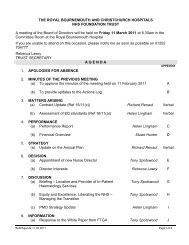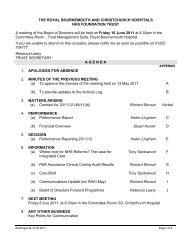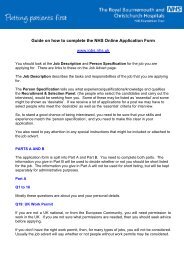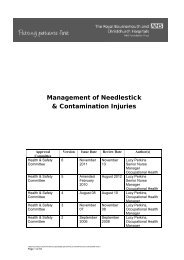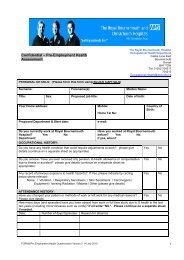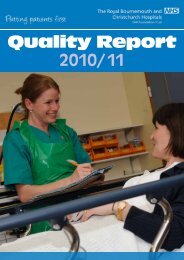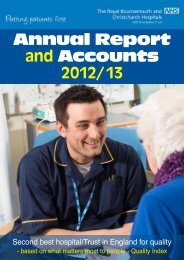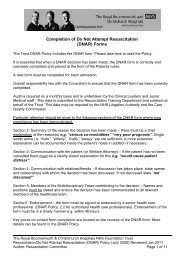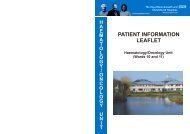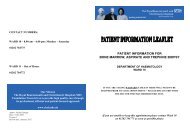A G E N D A 1. APOLOGIES FOR ABSENCE Ian Metcalfe 2 ...
A G E N D A 1. APOLOGIES FOR ABSENCE Ian Metcalfe 2 ...
A G E N D A 1. APOLOGIES FOR ABSENCE Ian Metcalfe 2 ...
You also want an ePaper? Increase the reach of your titles
YUMPU automatically turns print PDFs into web optimized ePapers that Google loves.
Board of Directors Part 114 June 20135. PATIENT REPORT5.1 Introduction91 patients were interviewed across all 9 wards. Typically 10 patients wereinterviewed from each ward, with the exception of Ward 1, where 11 wereinterviewed. The full, tabulated results for all wards can be found at AppendixA. A ward-by-ward breakdown can be found at Appendix C.5.2 Results and responses5.2.1 Do you think there are enough nursing staff on this ward at night?56% of patients felt there were enough nursing staff on their ward at night.Many of the comments received were very positive about the quality of thenursing at night, although many did also mention they felt the staff wereworking very hard. Ward 9 is typical in this respect with six patients remarkingthat the staff were extremely busy and not always able to attend to those inpain. However, they also felt the staff were professional and caring.Several patients from different wards felt that staffing levels were adequate onquiet nights but very poorly or difficult patients stretched staff. Of the twopatients on the Acute Medical Unit (AMU) who felt there were not enoughstaff, neither felt their personal care had been affected by this, something thatwas echoed across many wards.However, the reasons given by patients on the Stroke Unit for feeling there arenot enough staff at night raise specific concerns around not answering callbells and medication being given late. A patient on this ward also told us thathe had had to wait until day staff came on for something to be done for him aspart of his ongoing care, leaving him in pain during the night.5.2.2 Have you experienced any difference between care during the dayand night?The majority of patients (79%) stated that they had not noticed any differencein care between day and night. The reasons the nineteen patients who saidthey had noticed a difference mirror answers to the previous question. Delaysin giving medication at night meant that patients had to wait to settle down tosleep and with fewer staff on the wards, confused patients and those withdementia were far more disruptive to their fellow patients, with some shoutingand banging tables.Patients on two wards noted difficulties in getting a doctor at night as thereason for finding care different between day and night. There was concernfrom patients on other wards at staff’s ability to cope with emergencies giventheir reduced numbers.However, one patient on AMU felt this ward was more ‘demure’ at night and aclear majority of patients felt the standard of nursing care was very high.3The Hospital at NightQuality/Performance



